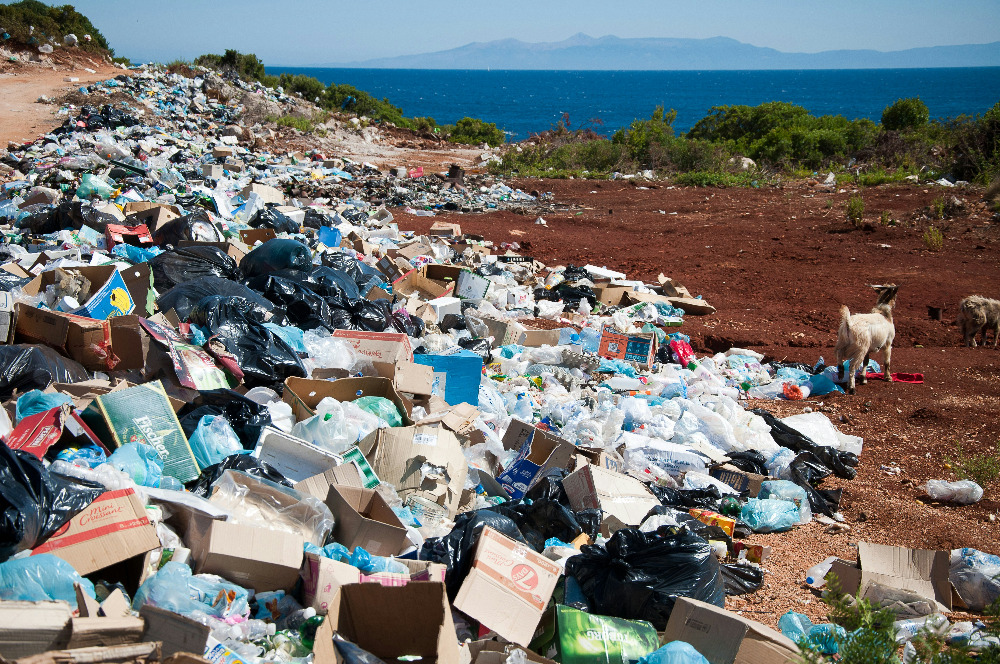Plastic. A generic term for numerous plastics that humanity has developed over time. Made from petroleum with numerous additives, this plastic used for housing, auxiliary materials, and packaging is inexpensive to produce. It has sufficient density for most products, is stable enough for many occasions, and is waterproof. However, large quantities of plastic fail to find their way into the recycling program. Not all manufacturers worldwide adhere to manufacturing guidelines. These vast quantities produced for our consumer society ultimately pollute our environment from production to disposal. A plastic bag takes 20 years to decompose in nature. A stable plastic bottle (PET bottle) takes up to 450 years.
Every hour in Munich, germany, so much plastic is thrown away that it could fill Bavaria, the statue of Bavaria's patron saint, in Munich.
*(Munich Waste Management Company in its waste quiz, 2018)
High output quantities mean high disposal quantities
The well-known magazine Welt-der-Wunder ("World of Wonders") already presented the leading countries in plastic waste in its December 2024 issue on page 55. Anyone who believes China is the main polluter with hazardous waste in this regard is mistaken. India is clearly in first place, with 9.3 million tons of plastic produced annually! This corresponds to 20% of the world's annual plastic waste production. It's also unimaginable that Nigeria and Indonesia, in particular, are still ahead of the neo-economic powerhouse China, with 3.5 and 3.4 million tons of plastics to be disposed of per year, respectively. China has commendably reformed the end-of-life of plastic products through improved waste management. This has enabled them to relinquish their former top spot for plastics disposal volumes.
*Photo by Antoine GIRET

According to the previous paragraph, the world's leading economic powers and their recycling programs are worthy of praise. Germany, the USA, Great Britain, and Canada do not make it into the top 10 list of global sinners when it comes to "plastic littering." High financial contributions and commitment to deposit-backed, disposal, recycling, and processing of plastics have certainly made their mark in recent decades. In an EU comparison, Ireland was identified as the main sinner in the area of plastic waste in 2022. Per inhabitant of the island, 67 kilograms of plastic waste were generated per year. A resident of the Federal Republic of Germany managed 39 kg in the same year, according to the data collection experts at Statista. However, the consumption of plastic packaging in industrialized nations is also highly critical. Everything is "shrink-wrapped"; it's supposed to be fresh. The Federal Republic of Germany consumed a whopping 3,200,000 tons of plastic packaging in 2022. They will soon be disposed of, wherever that may be.
High greenhouse gas emissions from production and processing
It is also socially and environmentally imperative to advocate for more environmentally friendly manufacturing and disposal systems, especially for industrialized nations. As the statistical research company Statista published for 2019, the majority of greenhouse gas emissions are attributable to the production and processing of plastics. The global plastics industry once generated almost 1.8 billion tons of CO₂ equivalent in greenhouse gas emissions. In 2020, Germany alone exported 13 million tons of plastic, in addition to imports and domestic consumption.
In 2022, around 400 million tons of plastic were produced worldwide, according to statistics experts. It's unlikely to decrease.
---
More about this:
Magazine Welt der Wunder im Artikel: "TOP 10 - Die größten Plastikverschmutzer der Erde". Ausgabe 12/24, S. 55. (German)
Data Research Department Statista: "Höhe der verursachten Treibhausgasemissionen durch Plastik weltweit in den Jahren 2015 bis 2019", "Freisetzung von Plastik in die Umwelt nach Quellen im Jahr 2019", "Plastikverpackungsabfall in ausgewählten EU-Ländern je Einwohner 2022", "Verbrauch von Kunststoffverpackungen in Deutschland in den Jahren 1991 bis 2022" (German)
